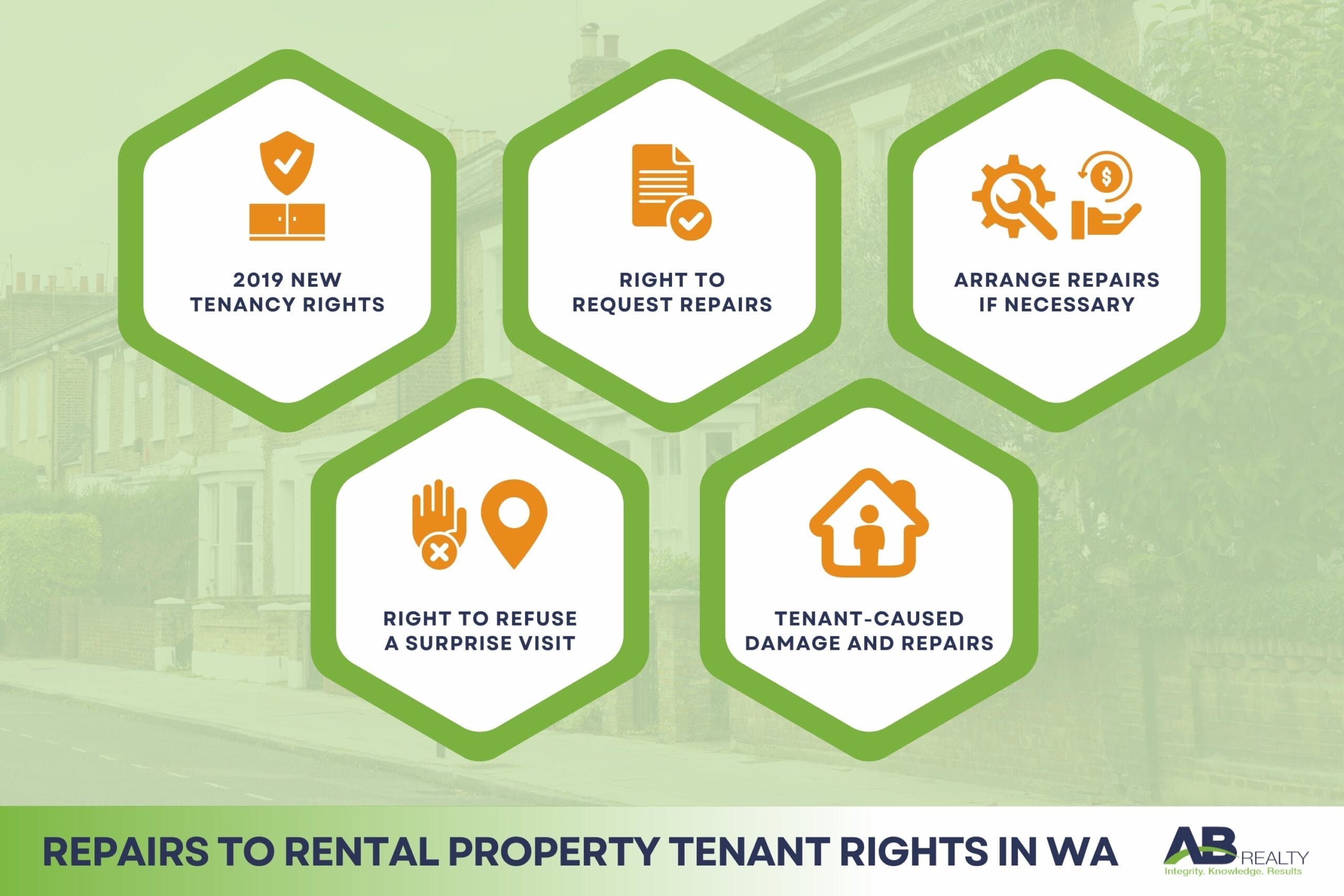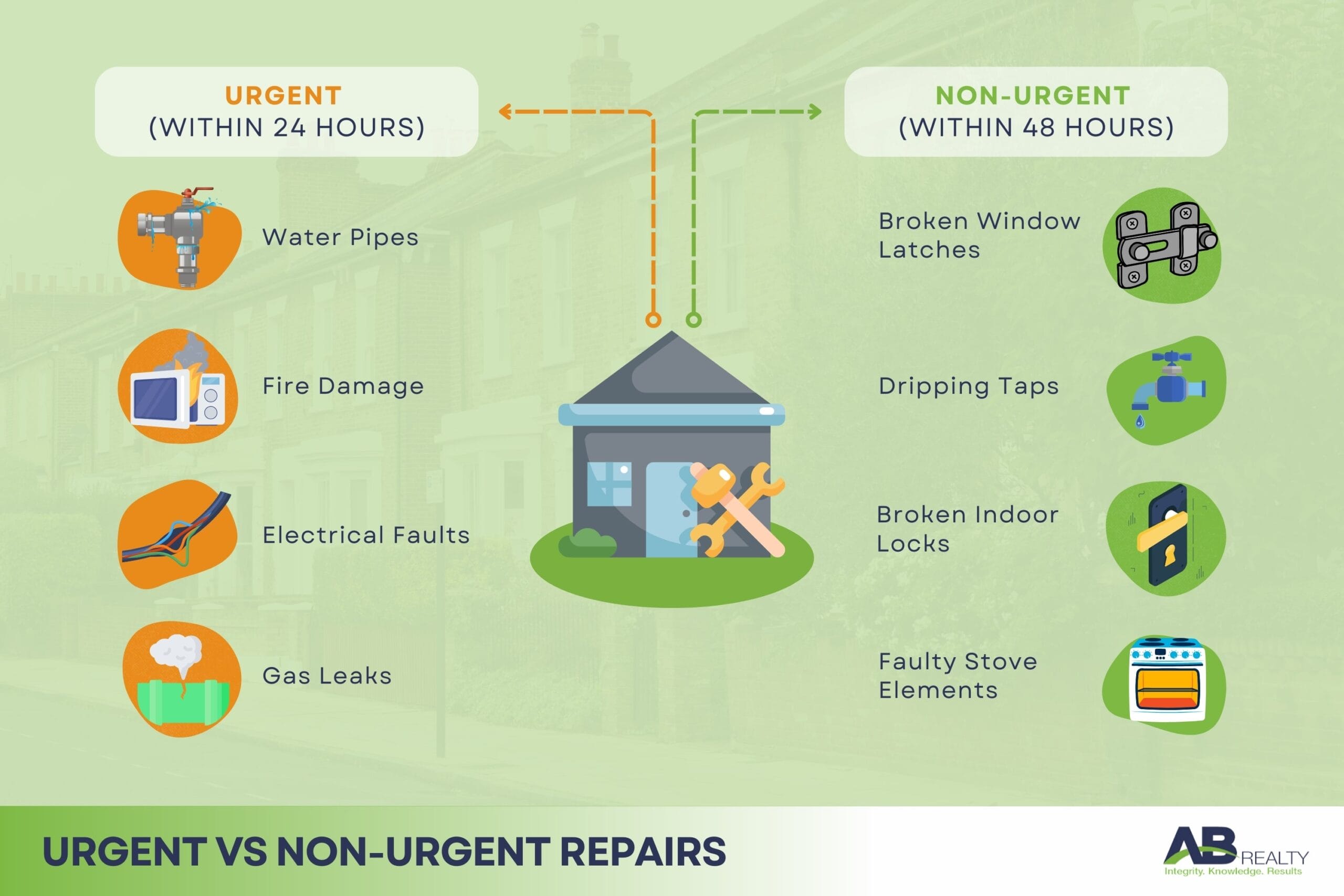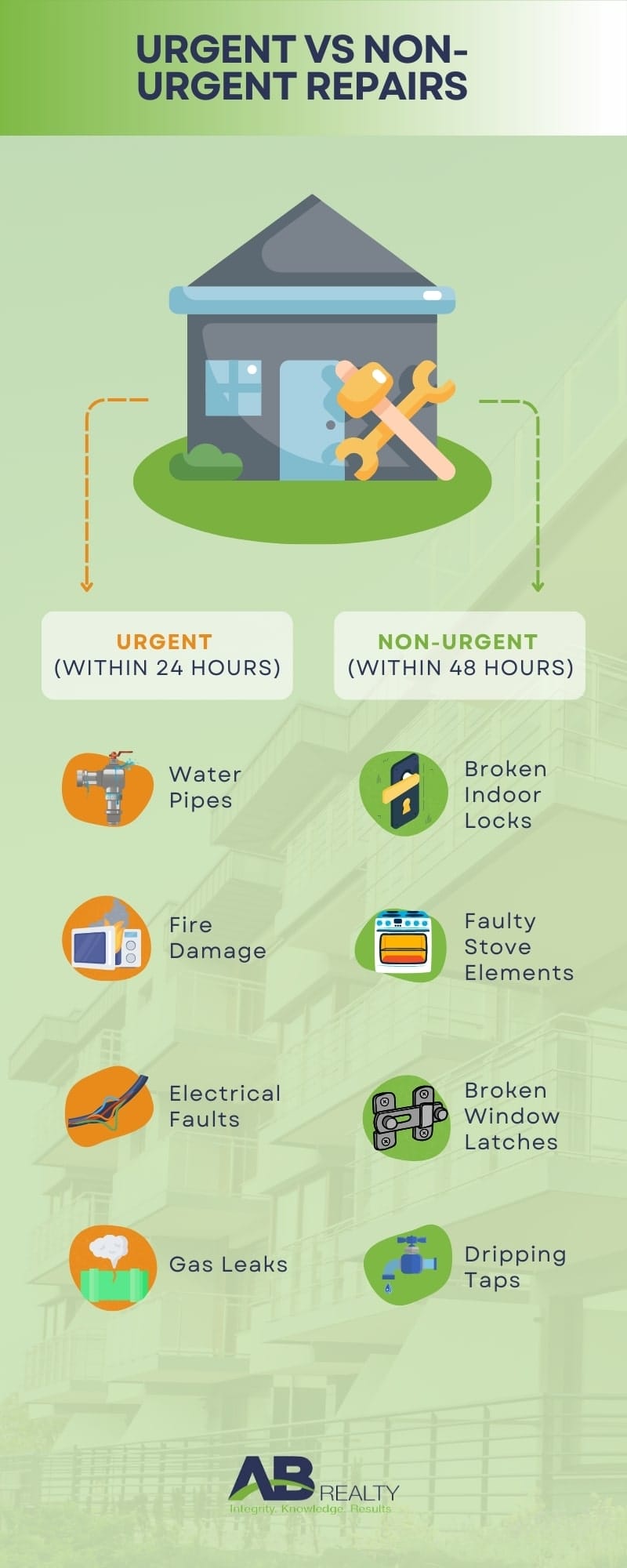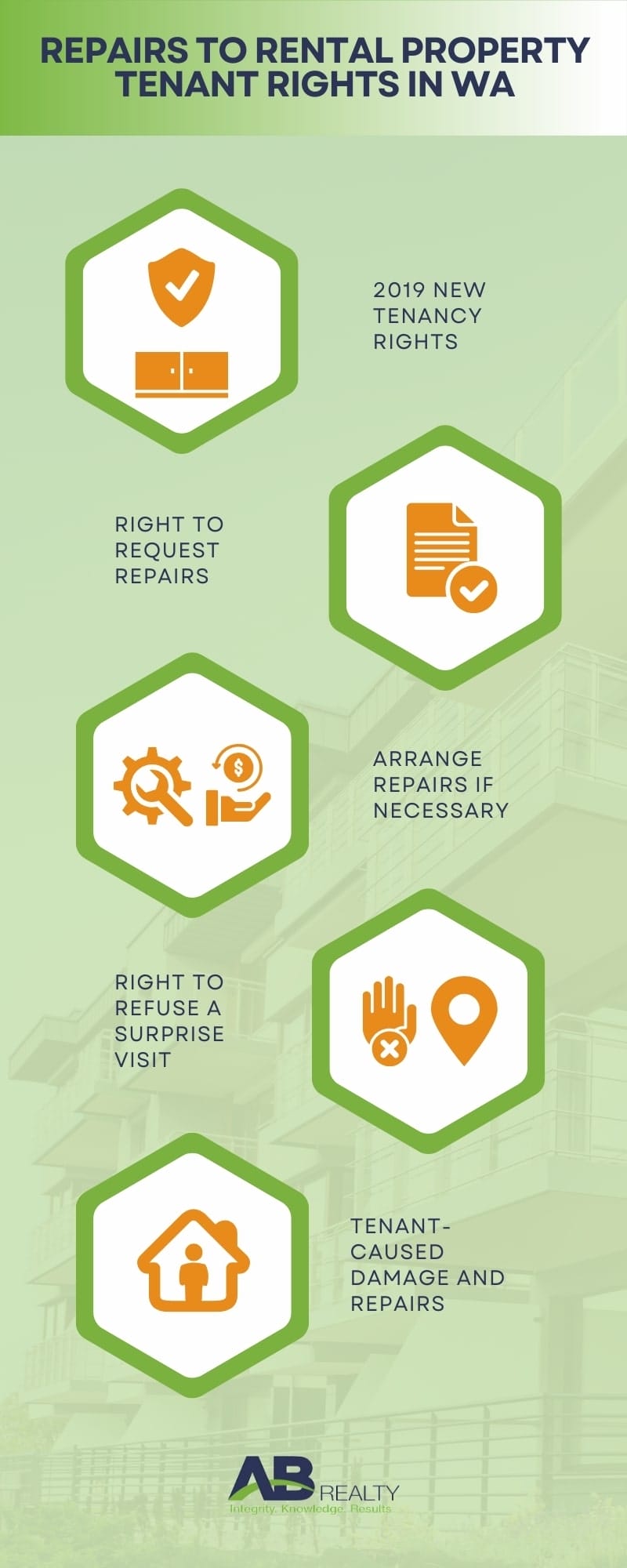
-
 20+ Years in the Wanneroo Realty Market
20+ Years in the Wanneroo Realty Market -
 150+ Managed Properties
150+ Managed Properties -
 10,000+ Residential Homes Covered
10,000+ Residential Homes Covered
News
Your Guide to Repairs to Rental Property | Tenant Rights WA

Tenants’ rights to repairs in rental properties in Western Australia are clearly defined to ensure that living conditions remain safe, secure, and habitable. Under tenancy laws, tenants are entitled to prompt and appropriate repairs for any issues that affect the property’s habitability.
The Residential Tenancies Act 1987 (WA) details how property maintenance and repairs should be handled, who is responsible, and how soon repairs should be done. But understanding repairs to rental property tenant rights in WA can be confusing, so here’s our quick guide.
Contents
- 1 Understanding Repairs and Maintenance
- 2 Tenant’s Role: Reporting and Maintaining the Property
- 3 Repairs to Rental Property Tenant Rights WA
- 4 Landlord Responsibilities WA: Keeping Your Home Liveable
- 5 Repairs to Rental Property Tenant Rights WA FAQs
- 5.1 Can a Tenant Withhold Rent for Unaddressed Repairs?
- 5.2 Can a Landlord Refuse Repairs If a Tenant Hasn’t Paid Rent?
- 5.3 What to Do If the Landlord Refuses Repairs?
- 5.4 How Can I Ensure My Repair Requests Are Documented Properly?
- 5.5 Can a Landlord Withhold Bond Money If Repairs Haven’t Been Done?
- 5.6 What Does Under-Contract Mean In Real Estate?
Understanding Repairs and Maintenance
If you live in a rented house managed by someone else, including the owner, it’s important to consult the property management to understand your repair responsibilities. Understanding repairs and maintenance will help you to understand your own responsibilities and rights.
Urgent vs Non-Urgent Repairs


How urgent a repair is will influence how long the landlord has to deal with it. For urgent repairs, the landlord should contact a qualified professional within 24 hours. Urgent repairs are problems that pose a severe risk to your health or safety if they aren’t fixed.
- Urgent repairs include burst water pipes, flooding, fire damage, electrical faults, gas leaks, blocked toilets, sewerage leaks, refrigerator faults, breakdown of heating or cooling services, and severe structural problems.
Non-urgent repairs – those that aren’t threatening your health or safety but still need attention – must be addressed within 48 hours of your landlord being notified.
- Non-urgent repairs include broken window latches, broken indoor locks, dripping taps, faulty stove elements, and broken cupboard handles or hinges.
Fair wear and tear that isn’t problematic can be addressed at the landlord’s discretion, as this doesn’t fall under essential repairs.
What is Fair Wear and Tear?
Fair wear and tear is normal deterioration that happens over time due to everyday living. Even when a tenant takes good care of the property, its condition is expected to decline slightly. Examples of fair wear and tear include:
- Fading: Curtains, carpets, and even paint can fade from exposure to sunlight.
- Ageing appliances: As your appliances get older, they often become less efficient, develop motor problems, or have issues with their appearance.
- Surface wear: Benchtops get scratched with use, floors wear down in high-traffic areas, and even walls become scuffed over time.
- Loose fixtures: Door handles, light switches, and hinges may become loose with age.
Fair Wear and Tear vs Damage
Damage refers to harm caused by the tenant, other people in the house, or pets outside of general everyday living. It may be caused by an accident, misuse, or negligence. Some examples include:
- Stains
- Burn marks
- Broken appliances
- Broken fixtures
- Pet-related damage
- Holes in walls or cupboards
Landlord’s Right to Access
Your landlord and any service providers they have hired will need access to your space when repairs are required. This should be at a reasonable time for you, but you’ll need to allow access as soon as possible to prevent further damage, especially with emergency repairs.
As the owner, your landlord also has the right to access your property for routine inspections, as long as they provide you with proper notice, which is 7 days. But these visits are limited to four per year, unless the landlord can prove they have a reasonable cause for another inspection.
Tenant’s Role: Reporting and Maintaining the Property
As a tenant, you have certain responsibilities when it comes to maintaining the property. It’s not just the landlord’s responsibility for repairs – here’s what you need to do.
- General upkeep: Everyday maintenance like keeping the house clean, replacing light bulbs, removing rubbish, pest prevention, and basic garden care.
- Report problems promptly: As a tenant, it’s your duty to report issues as soon as they show up, so they can be fixed fast.
- Provide reasonable access: Be flexible and work with your landlord when it comes to repairs. This will help to get them done as soon as possible.
Repairs to Rental Property Tenant Rights WA
While you have responsibilities as a tenant, you also have tenant rights, including the right to expect fast and effective repairs. Here are more details on repairs to rental property tenant rights in WA:


2019 New Tenancy Rights
WA tenancy laws received an update in 2019, which gives tenants stronger rights, including:
- The right to improve their rental property’s security
- The right to attach furniture to walls when living with a child or disabled person, to prevent accidents.
The Right to Request Repairs
Notify your landlord as soon as you come across any repair issues. You can make a phone call, but we recommend putting it in writing for future reference.
- Send a written notification: Email is a good choice as it maintains a record that you’ve reached out, with the date.
- Specify the issue: Describe the problem accurately, including where it has happened and any safety hazards it has or could cause. Add photos or videos to support your description.
- Request the repairs: Clearly state that you’re requesting repairs, and base your time frame on whether the repair is urgent or non-urgent.
You Can Arrange Repairs If Necessary
Tenants have the right to arrange their own repairs if
- They can’t get in touch with the landlord within 24 to 48 hours, or
- The landlord does not take steps to arrange for repairs within that time frame.
In this case, you also have the right to be reimbursed for the repairs, as long as they fall under regular repairs and were not caused by you or anyone else in your home.
If there’s a problem with being paid back, you can lodge a complaint with the Department of Mines, Industry Regulation, and Safety. Or, you can apply to the Magistrates Court to speed up a resolution.
The Right to Refuse a Surprise Visit
If your landlord or the property owner hasn’t given you at least 7 days’ notice before a property inspection, you have the right to refuse a visit. Landlords are allowed access to your property, but surprise visits are a breach of your tenancy agreement.
Should you feel the need to, you can issue them a formal notice stating that the lease terms of your tenancy agreement have been breached.
Your Rights with Tenant-Caused Damage and Repairs
Fair wear is to be expected. But if bigger damage to property or appliances is caused by you, someone else in the house, or a pet, then you’ll be liable for the cost of repairs. For example, if your dog chews the furniture, or you spill a drink on the carpet, the landlord isn’t responsible for covering the costs. This goes for urgent and non-urgent repairs.
Landlord Responsibilities WA: Keeping Your Home Liveable
Landlords are responsible for making sure the property is liveable and safe, and that it provides all the basic needs a tenant is entitled to. According to the Residential Tenancies Act 1987 (WA), your landlord must:
- Fix general wear and tear: Any fair wear that develops over time from normal, reasonable use. This covers furniture, plumbing, and appliances.
- Address repairs: Getting quotes, finding a suitable repairer, and arranging for them to make the repairs.
- Maintain essential services: Hot water, plumbing, sanitation, and electricity must be in working order and contribute to a safe, healthy environment.
- Attend to structural repairs: Walls, roofs, windows, plumbing, and electronics.
- Keep pests under control: As long as the pest problem isn’t a direct result of the tenant’s actions, landlords must cover this.
- Provide working locks: Ensure the property is reasonably secure, including working locks and other security devices.
- Install safety devices: Landlords must install at least two residual current devices (RCDs) and working smoke alarms.
Repairs to Rental Property Tenant Rights WA FAQs
Can a Tenant Withhold Rent for Unaddressed Repairs?
No, tenancy laws don’t allow a tenant to withhold rent from their landlord if repairs have been unaddressed. However, if the tenant has paid out of pocket to address the landlord’s lack of repairs, they may deduct the cost from their rent.
Can a Landlord Refuse Repairs If a Tenant Hasn’t Paid Rent?
No, a landlord cannot withhold urgent repairs if a tenant hasn’t paid rent. Even if unpaid rent is due, the landlord is required to address repairs to make sure the home is safe and liveable. The exception is if the tenant has caused the repairs themselves – in this case, the tenant is responsible for repair costs.
What to Do If the Landlord Refuses Repairs?
Tenants in Western Australia can serve a breach notice on their landlord if they have not received a response to written notifications and requests for repairs within the required time frame. If the landlord continues to ignore requests, tenants can apply to the Magistrates Court to resolve the issue. In some cases, the court may grant a rent reduction until the repairs have been taken care of.
The tenant may also be entitled to compensation if there’s damage to their property as a result of the landlord not arranging for repairs in a timely manner.
How Can I Ensure My Repair Requests Are Documented Properly?
The best way to document your repair requests is to ensure you have both digital and physical evidence of your requests. For this reason, we recommend sending an email and printing out your own copy, or sending a letter via registered mail. Be sure to file your requests and save them for as long as you remain on the property.
Can a Landlord Withhold Bond Money If Repairs Haven’t Been Done?
A landlord may withhold your bond (aka, security deposit) if the property has been damaged by the tenant and is not returned to its original condition by the time the tenant moves out, even if the landlord handed over a termination notice.
However, the bond money should be paid out if the property is still in good condition with normal wear and tear, even if repairs have been carried out during the tenant’s stay.
It’s important to note that the landlord doesn’t hold the bond amount – it’s held by the Bond Administrator, a government-managed account that falls under the Department of Mines, Industry Regulation, and Safety.
What Does Under-Contract Mean In Real Estate?
We have made a separate article that discusses what under-contract means in real estate.
Back to top: Your Guide to Repairs to Rental Property




